Black Mental Wellness Symposium
Saturday, April 27, 2024 | The Heights Room, Corcoran Commons | Boston College | Please register to attend
Please note that this conference will only be available to attend in person and will not be streamed online.
CEUs will be provided for participants attending the full event.
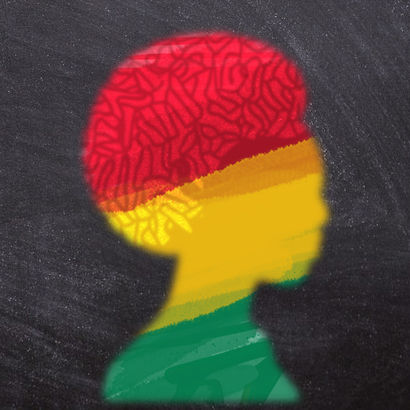
Black mental wellness has been significantly impacted by the effects of the historical and generational experiences of many people of the African diaspora characterized by the physical and emotional trauma as well as acts of violence (slow and fast, psychological and physical) they experience daily. Social injustice, oppression, and violence against Black people continue to be experienced through interpersonal, structural, and institutional racism that significantly affects their mental health. This is further complicated by the mistrust within the Black community towards the mental health system, which has historically been fueled by institutional bias, racism and inequities. The Black Mental Wellness Symposium will center the spiritual, social, and mental wellness of the lives of Black people in order for participants to obtain culturally-grounded, workable strategies, and resources to support, encourage and bolster the wellness of Black people.
The Black Leadership Initiative (BLI) at the Boston College School of Social Work is a social work training program that takes an Afrocentric approach to social work practice. The Afrocentric perspective is a culturally grounded social work practice-based model that affirms, codifies, and integrates everyday cultural experiences, values, and interpretations that cut across people of African descent. The program emphasizes community, collective action, cultural context, and Ubuntu- the West African concept of shared consciousness and group cohesion. The Black Mental Wellness Symposium is rooted in the Afrocentric framework and aims to further uplift the Black community within Boston College and the Greater Boston areas to emphasize the importance of Black mental health and wellness. The Symposium will share the Afrocentric perspective as it relates to mental health and wellness with a goal of exploring culturally-grounded, workable strategies and resources to support, encourage and bolster the wellness of Black people.
Cosponsored by the Black Leadership Initiative at Boston College School of Social Work
Schedule and RegistrationSaturday, April 27, 2024 | The Heights Room, Corcoran Commons | Please register to attend | |
|---|---|
| 8:00-9:00 AM | Breakfast & Registration |
| 9:00-9:30 AM | Welcome & Greetings |
| 9:30-10:30 AM | Keynote Speech with Dr. Martell Teasley |
| 10:30-10:45 AM | Break |
| 10:45 AM-12:00 PM | Panel: Reclaiming Healing as an act of LiberationPanelist:Nieisha Deed Albert Pless Dr. Melissa Bartholomew |
| 12:00-1:00 PM | Lunch |
| 1:00-2:30 PM | Concurrent Workshops | Boston & Newton RoomWorkshop 1: Embodiment: Beyond Talk Therapy Workshop 2: The Danger of Hope™: Creative Methods for Emotional Processing Workshop 3: Afrocentric Wellness: A Culturally-Grounded Model of Liberation |
| 2:30-3:30 PM | Wellness Mixer |
CEUs will be provided for participants attending the full event.
Speakers
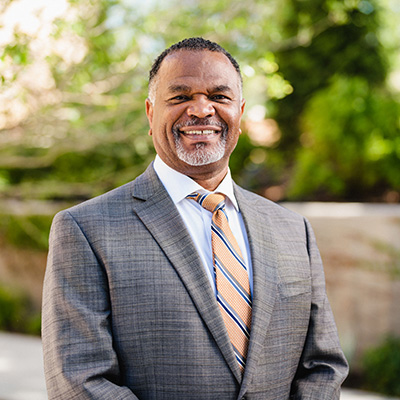
Martell Teasley
Dr. MARTELL TEASLEY is Associate Provost for Strategic Academic Initiatives at the University of Utah, and he is the former Dean of the College of Social Work at the University of Utah. From 2017 to 2023 he was a two-term president of the National Association of Deans and Directors of Social Work. Martell was Professor and Chair of the Department of Social Work in the College of Public Policy at the University of Texas at San Antonio from 2012 until 2017. He is the former editor-in-chief (2015-2018) of the NASW journal Children & Schools. As the lead investigator on the Social Work profession’s Grand Challenge to Eliminate Racism, his major areas of research interest are African American adolescent development, school social work practice, and diversity in social work education. Dr. Teasley has published over 60 peer-reviewed articles and book chapters on a variety of topics dealing with social work practice and the educational outcomes of African American youth. He is the former Chair of the Social Work and Disaster Recovery Program at Florida State University College of Social Work. He served in the U.S. Army for 10 years and participated in the First Persian Gulf War as a Licensed Practical Nurse. His education includes a Bachelor of Science in Psychology and a Bachelor of Arts in Sociology from Fayetteville State University in North Carolina in 1994. He received a Master of Social Work from Virginia Commonwealth University in Richmond, Virginia in 1996, and his doctorate in Social Work in 2002 from Howard University, located in Washington, DC.
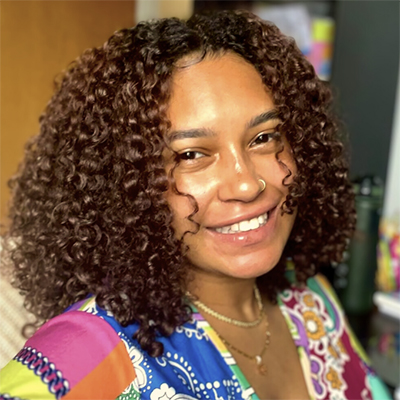
Kaila Atkins
Kaila graduated from Northeastern University with her Bachelor's of Science in Psychology (B.Sc) with minors in Business Administration and Human Communication. She has received her Master of Social Work (MSW) at Boston College with a concentration in Afrocentric Social Work, and was a member of the Black Leadership Initiative (BLI). Kaila has provided counseling in residential, community- based and out-patient settings for individuals whose ages ranged from elementary school to seniors. She utilizes empowerment, strengths-based, and Narrative theoretical models to help clients meet their individual needs. In Kaila's free time she enjoys traveling, listening to music, and being a plant mom.
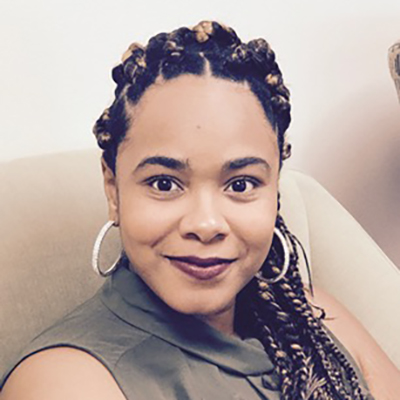
Lujuana Milton
Lujuana Milton, MSW, LICSW graduated with a Bachelor of Arts (BA) and a Masters of Social Work (MSW) degree from Boston College. She has over 16 years of clinical experience in the field and has worked in a number of settings addressing issues of anxiety, depression, substance abuse, opposition/defiance, and trauma. She has been trained extensively in a number of treatment approaches including traditional talk therapy, Cognitive Behavioral Therapy (CBT), Dialectical Behavioral Therapy (DBT), and Eye Movement Desensitization and Reprocessing (EMDR). She also provides consultations and workshops with local community and school districts regarding issues affecting children, adolescents, and families such as substance abuse, anxiety, depression, and self-harm. Lujuana’s clinical practice centers African values and principles in service of clients of the African Diaspora.
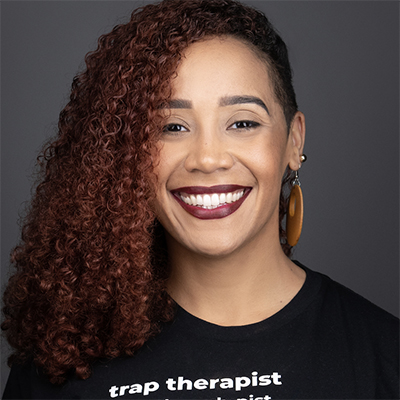
Vanessa Benzan Monteiro
Vanessa Sujey is a passionate and energetic individual who thrives on thoughtful conversations about life. With a background in social work, she brings a unique perspective to understanding the intersection of mental health and personal evolution. Vanessa's eclectic approach combines Internal Family Systems therapy with embodied practices like FLOW breathwork, sound baths, and energetic healing. She is dedicated to empowering melanated women in their journey to answer life's big questions, fostering both intellectual and holistic growth. Join Vanessa on a transformative path of self-discovery and empowerment.
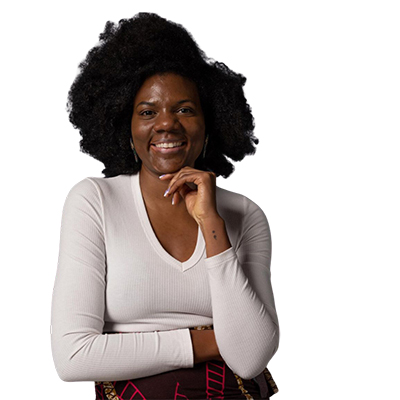
Nieisha Deed
Nieisha Deed is a powerful emerging voice and leader in the mental health and wellness space in Boston and is working fiercely to advocate for mental wellness in Boston’s Black community. She is the visionary and creator behind PureSpark. As a person living with bipolar disorder, Nieisha understands all too well how important access to holistic support services and community are to one’s mental wellness. As a Black woman, Nieisha is a community builder and disruptor in the mental health and wellness space. She is dismantling the walls of silence by raising awareness about mental illness and wellness, not just through PureSpark, but with speaking engagements and facilitated events, where she shares her personal story as a Black woman living with a mental Illness. Because the Black community has historically been left out of the conversations about mental health and wellness, Nieisha feels that it’s vital to share her personal experience and voice with her community. Through her leadership, Nieisha shatters the shame around mental illnesses, creates access to mental health support, and shows us that healing is possible.
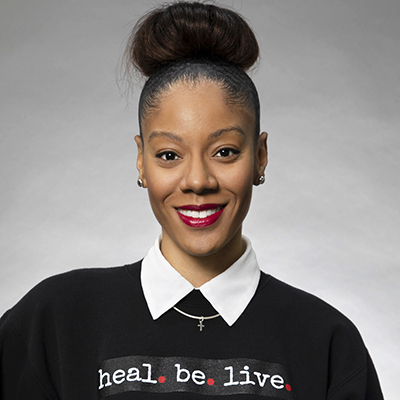
Morgan Breon
Morgan Breon is a three time graduate from the University of Michigan Ann Arbor—Dual Masters in Social Work and Education Policy, and Dual Bachelors in Psychology and English. She is a Certified Relationship Coach in the Gibson Integrated Attachment Theory.
Her core passion is fostering healing and support for Black youth and young adults. She has been a volunteer and mentor with foster care and adoption agency Spaulding for Children since 2012. In addition to facilitating youth workshops through her program, P.O.W.W.E.R. Training, for over 7 years, Morgan was the Behavior Specialist for the 9th Grade Academy at Denby High School and served as the Manager of Behavior and Culture at GOAL Line (Detroit Community Education Commission).
In 2017, Morgan decided to incorporate her gift for acting and playwriting into her “healing work,” and founded heal.be.live., LLC. She is an award-winning playwright, a 2017 Mitten Lab Fellow, 2017-2018 University Musical Society (UMS) Artist in Residence, 2018 Playwriting Scholarship Recipient with PlayPenn Theatre in Philadelphia, PA, 2018 Kresge Arts in Detroit Fellow, 2021 4.0 Essentials Fellow, 2022 Eastern Michigan University Porter Chair recipient, 2022 4.0 Tiny Fellow and a 2022 Comcast RISE Technology Recipient. Her work has been presented at ASHE, AERA, OABSE, CEYou Plus, and a plethora of schools, universities and community organizations. (www.healbelive.com)
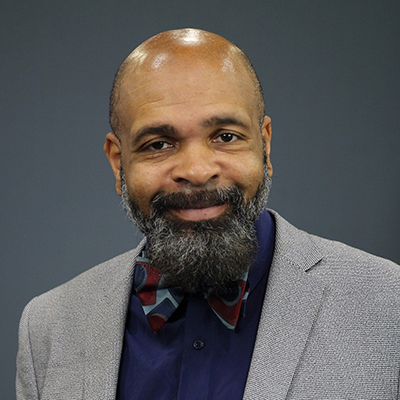
Albert W Pless, Jr.
Albert W. Pless, Jr, is the Director of Diversity, Equity, and Inclusion at the Office of Equity and Social Justice for the Town of Reading. He was the previous Inaugural Director of Diversity Equity, and Inclusion for the Town of Andover. He has over 25 years of experience working in public health, and community-based programs in the Greater Boston area. In addition, he directed nationally recognized Community Health Worker programs for Black and Latino men at both the Boston Public Health Commission and Cambridge Public Health Departments. He is on numerous boards and committees, including the Men’s Health and Black Health Care Workers Caucus of the American Public Health Association (APHA) and Harvard Catalyst. Albert has committed his entire professional career to addressing health and racial inequities. He received my Master of Science degree from Southern New Hampshire University in Manchester, NH.
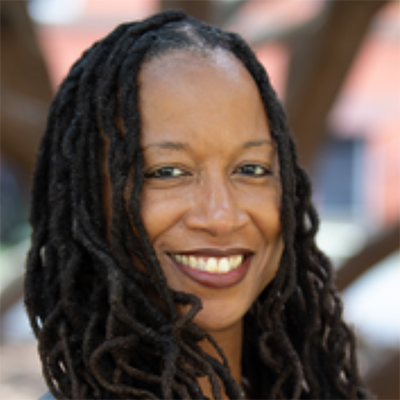
Melissa Wood Bartholomew
Melissa Wood Bartholomew (she/her), MDiv ’15, is the Associate Dean of Diversity, Inclusion, and Belonging and Lecturer on Diversity, Inclusion, and Belonging at Harvard Divinity School. She is a Christ-centered minister and a racial justice and healing practitioner committed to a multifaith, multidisciplinary, Afrocentric approach to healing justice rooted in the African philosophy of Ubuntu, restorative justice, and love.
Melissa’s passion for racial and social justice was cultivated at Howard University where she received her undergraduate and law degrees. She is an attorney with nearly a decade’s experience in public interest law. Through her experiences in Seattle practicing law as an Assistant Attorney General, as a legal aid attorney with the Northwest Justice Project, and working as a mediator in King County Superior Court, it became clear to Melissa that the law could not facilitate the heart changes required to eradicate racism and oppression from individuals and systems. Her call to ministry led her to pursue her MDiv at HDS. Melissa is earnestly committed to eradicating racism and oppression and advancing healing and societal transformation through spiritually-engaged, heart-centered multifaith and multidisciplinary strategies rooted in love. She is a restorative justice practitioner and has studied restorative justice in Rwanda, transformational leadership in Ghana, and has published various articles exploring racial justice and healing. Melissa received her MSW from Boston College where she received her PhD in social work. Her research interests include the impact of racism, incarceration, and other systems of oppression on the mental health of Black people and the role of religion and spirituality in their resistance. She serves as part-time faculty at Boston College where she teaches restorative justice at the School of Law and has taught diversity in the School of Social Work.
Workshop Descriptions
Led by Vanessa Benzan-Monteiro
Workshop Description:
In this experiential workshop, we will go through ways to integrate the work of Self-awareness. Assessing Self-awareness is deepening the connection between mind-body-emotions-and behaviors as indicators of what may be getting in the way, and if Self energy is accessible. Supporting our clients in getting to know their systems aids in more preventative work instead of always accessing interventions to manage behaviors. Join me for this experiential workshop where we will learn about how trauma informs our alignment, how to incorporate full embodiment into your sessions, and tools to address misalignment.
Workshop Objectives:
1. Participants will identify the 4 components of alignment in relation to trauma work and incorporate strategies to address misalignment
2. Participants will demonstrate how to use IFS 8 Cs in relation to the self-alignment model
3. Participants will identify ways in which trauma appears as misalignment
4. Participants will be able to support clients in deepening their own Self-awareness
Led by Morgan Breon
Workshop Description:
The presentation will incorporate clips from the performance of “The Danger of Hope™” which chronicles some of the stories of these 9th graders' introductions to creative methods. The performance clips will be followed by a presentation of research about creative methods. After discussion and self-reflection activities, participants will have the opportunity to practice creative methods discussed. Participants will learn about a minimum of two creative therapeutic methods that can be used with Black students for support in emotional processing.
Workshop Objectives:
Introduction to creative methods for engaging students and clients.
Introduction to tools to facilitate creative approaches to mental health work.
Provide an opportunity to experience/practice the use of creative methods.
Consider ways creative methods may increase the ability to support Black youth and/or youth who have experienced multiple ACEs.
Consider ways creative methods support clients in processing emotions.
Demonstrate “superpowers” of creative methods.
Led by Atkins & Milton
Workshop Description:
The workshop will explore a culturally-grounded, whole-health model, designed specifically to live in service to the robust communities of the African Diaspora. Participants will identify culturally congruent healing tools for use in one’s personal and professional life that are centered in the African values and principles of Ma’at and Nguzo Saba, to encourage and bolster liberated healing to those we serve.
Workshop Objectives:
Identify an Afrocentric Wellness Model that illuminates the principles of Ma’at and Nguzo Saba to nurture the whole-health of those we serve
Identify the impact of systemic marginalization and oppression on the wellness of individuals of African descent
Utilize an Afrocentric Wellness Inventory to identify ones wellness domains
Name culturally congruent wellness practices and strategies to utilize based on wellness domains
Panel Descriptions
Reclaiming Healing as an act of Liberation
Panelists:
Nieisha Deed
Albert Pless
Sean "2ruTh7" Evelyn
Dr. Melissa Bartholomew
The panel will center the spiritual, social, and mental wellness of the lives of Black people in order for participants to obtain culturally-grounded, workable strategies, and resources to support, encourage and bolster the wellness of Black people. The panelists who have experience in a number of different areas of mental wellness including Black men's mental wellness, wellness advocacy, and abolitionism will center the use of skills grounded in critical thinking, creativity, and cultural responsiveness will inspire personal and professional reflection and growth that will be both liberating and healing. The panel's overall goal is to provide additional strategies and resources helpful to mental wellness within the Black community.
Campus Map and Parking
Campus Map and Parking:
Parking is available at the nearby Beacon Street and Commonwealth Avenue Garages.
Boston College is also accessible via public transportation (MBTA B Line - Boston College).
Boston College strongly encourages conference participants to receive the COVID-19 vaccination before attending events on campus.

